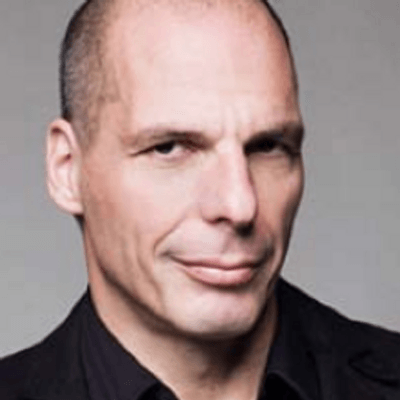The Feisty New Greek Finance Minister Used to be a Video Game Economist
- OurStudio

- Feb 13, 2015
- 2 min read

via Twitter
Over at The Week my friend Pascal-Emmanuel Gobry has a nice, short write-up of the new Greek finance minister, Yanis Varoufakis, who has recently been making waves for his pugnacious, distinctly non-political style.
Reuters recently labeled him an "unlikely heartthrob" and a television news anchor in Germany (Varoufakis' chief political and economic antagonist) described him as "a man full of charisma…someone you could imagine starring in a film like Die Hard 6."
Gobry argues that he's so fascinating in large part because he's not a traditional bureaucrat.
Varoufakis is also interesting because he's not a politician. He's not even an activist. He's just an economics professor. Worse: He's a blogger. Varoufakis was an economics professor at the University of Athens, until his acid and intelligent commentary on the Greek crisis gave him global notoriety (at least among people who follow economic writing). As his Twitter bio (still unchanged since being named minister) puts it, he was "quietly writing obscure academic texts for years, until thrust onto the public scene by Europe's inane handling of an inevitable crisis." (And, let's face it, writing brilliant posts until one is plucked into a key decision-making job is every blogger's dream. Cough.) Even after being named finance minister, Varoufakis still doesn't mind picking fights on the internet and lambasting journalists as idiots — not typical finance minister behavior (at least in public).
Varoufakis is a Marxist game theory specialist with economics Ph.D, which also makes him somewhat unusual in the political realm. Gobry argues that his preferred solution to the Greek debt crisis—a major renegotiation of the nation's debt with Germany—is one that Milton Friedman would have agreed with.
Sadly, Friedman isn't around to weigh in on the particulars of this economic debate, but I can vouch for the fact that Varoufakis is extremely clever and interesting. I spoke with him last year about his stint working as the in-house economist for the video game company Valve (maker of the Portal and Half Life games, as well as the Steam online game platform), and he turned out to be a fascinating interview subject.
One bit that sticks out to me came in a segment discussing his longstanding bias against economic models:
Varoufakis: …Let me put it very brutally and very bluntly: Our best economic models-from the Federal Reserve or the U.S. Treasury or the International Monetary Fund or the Organization for Economic Development-are really not worth the trouble of putting together. Because they are presuming a kind of equilibrium stability and convergence toward equilibrium, because it makes our models look better. It is not something that is replicated in the real world.
reason: You once wrote that because of its heavy reliance on statistics and on this sort of simple modeling, economics can resemble "computerized astrology." That's pretty harsh. Could you talk a little bit more about that judgment and whether you think that studying economics in a virtual world-where you're not just looking at a model, you're looking at real behaviors and real interactions amongst thousands or millions of people-offers a way out of an economics stuck in a model-bound world? Varoufakis: If we think of ourselves as empiricists who judge the value of the theory on the basis of how well it predicts, then we should have ditched economic models years ago. Never have our models managed with data to predict the major turning points, ever, in the history of capitalism. So if we were honest, we should simply accept that and rethink our approach. But actually, I think they're even worse. We can't even predict the past very well using our models. Economic models are failing to model the past in a way that can explain the past. So what we end up doing with our economic models is retrofitting the data and our own prejudices about how the economy works. This is why I'm saying that this profession of mine is not really anywhere near astronomy. It's much closer to mathematized superstition, organized superstition, which has a priesthood to replicate on the basis of how well we learn the rituals.
Video games, he argued in the interview, offer a potential solution to this problem by allowing economists to conduct controlled experiments on macroeconomies, and obtain perfect real-time data in the process. That's obviously a ways off, however. And in the meantime, he'll have to work on solving Greece's debt woes without the benefit of video game simulations.




Comments